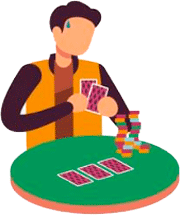As online gambling in Canada As gambling becomes more prevalent, the associated risks of developing an addiction increase as well. An individual struggling with gambling feels an intense compulsion to gamble online, frequent casinos, and place sports bets. They often lack the ability to rein in their behavior, continuing down a harmful track despite facing serious repercussions in their personal lives. This article delves into four key insights surrounding gambling addiction and the path to recovery.
Four Key Insights into Gambling Addiction and Recovery
1. Problem Gambling is Considered a Behavioral Addiction
Experts in mental health and research have categorized problem gambling as a type of behavioral addiction. ambling addicts show similar changes in behavior and brain activity as drug users and alcoholics. Defective brain functioning may play a central role in the self-destructive behavior of problem gamblers.
ambling addicts show similar changes in behavior and brain activity as drug users and alcoholics. Defective brain functioning may play a central role in the self-destructive behavior of problem gamblers.
Development of Gambling Addiction
As a person engages in gambling more frequently, the likelihood of their addiction intensifying a rises. Brain imaging has shown that gambling stimulates the brain's reward pathways, providing a sense of euphoria that can be akin to the highs experienced by drug addicts.
Research indicates that your risk for developing an addiction is higher if you have relatives who have struggled with substance abuse.
Impaired Brain Function
The prefrontal cortex, which governs impulsivity, judgement, and decision-making, has been found to function less effectively in those who are addicted to gambling or drugs compared to individuals without such addictions. Many problem gamblers exhibit impulsive behavior, struggling to manage their urges due to the impaired functioning of this vital brain area.
Moreover, addicted individuals typically misinterpret risk and reward, along with the balance between immediate gratification and long-term consequences.
Addicts Often Use Gambling as an Escape
A number of individuals grappling with addiction are also faced with mood disorders like anxiety and depression, which lead to negative self-perceptions. For such individuals, gambling offers an avenue to relieve themselves from everyday stresses, inadvertently heightening their anxiety over time.
2. Therapeutic Approaches Can Aid Those with Gambling Addictions
 Treatment approaches are similar to those used for drug and alcohol addicts. Cognitive and behavioral treatments can help problem gamblers understand the need to change their thinking about gambling. Therapy encourages them to reevaluate risky thinking, such as predicting the outcome of their next bet based on previous successes.
Treatment approaches are similar to those used for drug and alcohol addicts. Cognitive and behavioral treatments can help problem gamblers understand the need to change their thinking about gambling. Therapy encourages them to reevaluate risky thinking, such as predicting the outcome of their next bet based on previous successes.
Behavioral therapy focuses on encouraging individuals to alter both their behaviors and surroundings to make gambling less accessible. For instance, limiting access to cash can be beneficial. It's crucial to address motivation, as understanding the impact of gambling can help individuals reconcile their mixed feelings about quitting.
3. Many Gambling Addicts Are Women
 The number of female gambling addicts is increasing and, in some age groups, even surpasses men. Treatment should consider that women get addicted to gambling for different reasons than men.
The number of female gambling addicts is increasing and, in some age groups, even surpasses men. Treatment should consider that women get addicted to gambling for different reasons than men.
- Life changes, such as divorce or retirement, can trigger compulsive gambling issues, particularly among women.
- Many women engage in gambling not primarily for financial gain but to escape from overwhelming situations.
- Women often begin gambling later in life compared to men, but they tend to develop problematic behavior more rapidly.
- Research suggests that women are more responsive to triggers related to gambling advertisements than men.
- The demographic of women seeking assistance for gambling addiction predominantly falls between ages 40 and 60.
Women suffering from gambling addiction also report higher instances of mood disorders and have frequently experienced physical abuse.
4. Preventing the Problem
While much focus is directed towards recovery for gambling addicts, it’s equally important to consider preventative measures. To deter the onset of gambling issues, individuals should be advised to:

Set a Money Limit
When visiting a brick-and-mortar casino, consider leaving credit cards at home and only bringing a pre-determined sum of cash. Establish a budget for online gambling to ensure you only spend what you intended for a night of fun. Determine a maximum amount you'd be okay with walking away with if you happen to win.

Know the Game to Control Your Bets
Understanding the mechanics of the games you play is crucial, as it can help you regulate your betting amounts, even though the outcomes are beyond your control. For example, slot machines can tempt players to wager on multiple lines, leading to higher bets than expected and rapid depletion of funds, possibly triggering a compulsion to withdraw more money to keep playing.

Set a Time Limit
Set reminders on your phone to indicate when it’s time to cease play, or when to leave a physical casino.

Focus on Entertainment
Mentally prepare to spend the entirety of your pre-set budget, which will help maintain your mindset of treating gambling as entertainment. This can help reduce the likelihood of trying to recoup losses through further betting.

Understand the Games Are Random
Activities like reviewing past outcomes won't lead to repeated winnings, as the results on slot machines are determined by a random number generator.
Final Thoughts
While gambling can serve as a harmless pastime, it may also act as a means of coping with life's stresses, similar to alcohol or drugs. It’s important to stay educated and make choices that prioritize well-being. Checking resources available at online casino ratings can support you in locating reliable platforms that emphasize player safety and responsible gaming practices. If there's concern that gambling might be negatively impacting your life, consider reaching out to a local problem gambling helpline for guidance.











